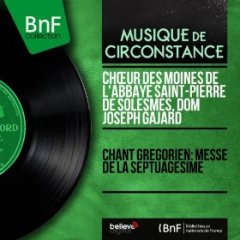Dom Joseph Gajard - Messe de la Septuagésime (1960)
Dom Joseph Gajard - Messe de la Septuagésime (1960)

1 Introit. Circumdederunt me in Mode V 00:03:47 2 Kyrie XI in Mode I 00:02:21 3 Oraison 00:00:55 4 Epître 00:02:09 5 Graduel. Adjutor in Mode III 00:04:16 6 Trait. De profundis in Mode VIII 00:04:50 7 Evangile 00:04:38 8 Credo I in Mode IV 00:04:27 9 Offertoire. Bonum est in Mode VIII 00:01:25 10 Préface 00:03:23 11 Sanctus XI in Mode II 00:01:49 12 Pater noster 00:02:02 13 Agnus Dei XI in Mode I 00:01:21 14 Communion. Illumina in Mode I 00:01:04 15 Postcommunion 00:01:01 16 Benedicamus Domino XI in Mode I 00:00:28 Choeur Des Moines De L'Abbaye Saint-Pierre De Solesmes Dom Joseph Gajard – director
With Septuagesima, we definitely abandon Christmas Time to enter the Easter cycle. External rites peculiar to this new liturgical season are: suppression of the Glória at mass, deletion of joyful Alleluias everywhere in the celebration, even at Deus in adjutorium meum intende, to which it virtually adheres, purple ornaments. All this is singularly evocative and sufficient to characterize the atmosphere in which the liturgy will now take place: it is a spirit of penance that will - increasingly so as we approach the holy celebration of the mystery of the Lord's passion - be the hallmark of the Church prayer.
In short, as Lent is preparation for the Holy Week, the Septuagesima period is a preparation for Lent. It is like a kind of anticipated Lent. It seems that before starting the great fast of atonement for the sins of the world, and leading to it, the Church makes us examine our conscience, remembering the mistakes and crimes that humanity has made itself guilty of, and which will be erased by the shedding of the redeeming blood: original sin and actual sins. As a matter of fact, it has us read in Genesis, during the week of Septuagesima, the story of creation and the fall from Eden, and during the week of Sexagesima, the story of the flood, so circumstantial.
We've all been subsumed in the death sentence pronounced in Eden. Let's just remember the repeated assertions of St. Paul and the definitions of the Church on the subject. It is this keen awareness of our misery before God that reflects the admirable liturgy of Septuagesima, including the Mass of the three Sundays of Septuagesima, Sexagesima and Quinquagesima. But one can also see, like in the liturgy of Lent, how the Church understands penance, done, of course, out of pain for our mistakes, but also with an invincible confidence in the infinite mercy of God. It is very good for the soul to reach such lofty heights. --- musique-liturgique.com
download (mp3 @320 kbs):
uploaded yandex 4shared mega mediafire solidfiles zalivalka cloudmailru oboom








